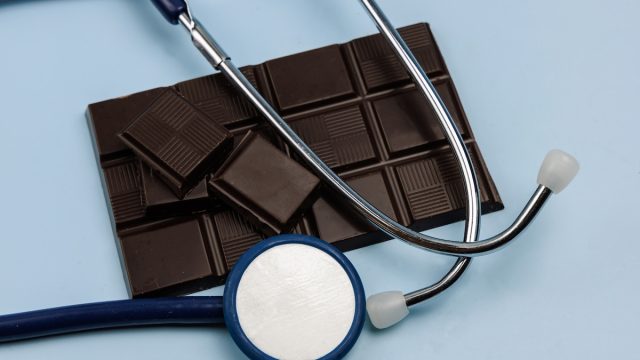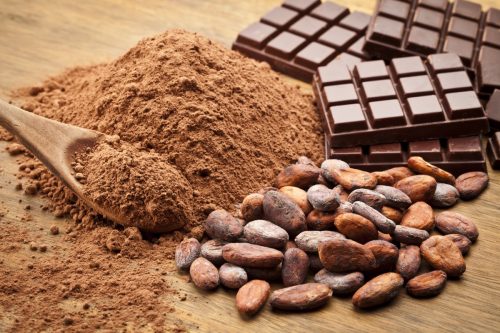10 Amazing Health Benefits of Eating Dark Chocolate, According to Science

When you want to have the occasional sweet treat, you don’t necessarily need to justify it with health benefits—but it’s still great news when those benefits exist. Dark chocolate stands out as one of the best desserts you can choose, full of antioxidants called flavanols that confer a whole host of health gains. Though it’s best to enjoy it in moderation—it’s still relatively high in calories, sugar, and fat—you may, in fact, be making a wellness-conscious decision by incorporating high-cocoa, polyphenol-rich chocolate into your routine. Ahead, learn about the 10 biggest dark chocolate health benefits.
RELATED: 22 Health Benefits Coming From Your Cup of Coffee.
1
It can lower your Type 2 diabetes risk.

Consuming milk chocolate has been linked to long-term weight gain, a known risk factor for Type 2 diabetes. However, a recent study published in The British Medical Journal (BMJ) suggests that eating dark chocolate in moderation may have the opposite effect.
The researchers analyzed more than 30 years of data from over 192,000 participants in major U.S. health studies, all of whom were diabetes-free at the start. Participants tracked chocolate intake by type and amount, along with weight and diabetes status.
While eating at least five ounces of any chocolate weekly was linked to a 10 percent lower diabetes risk compared to those who “never or rarely” eat chocolate, dark chocolate stood out. Those who ate at least five servings of dark chocolate per week had a 21 percent lower risk, with an added 3 percent “reduction in risk” for each additional day—meaning a daily serving could lower risk by up to 27 percent.
2
It could slow cellular aging.

A new, December 2025 study published in the journal Aging suggests that dark chocolate may also help slow down cellular aging, thanks to a natural compound called theobromine. Theobromine comes from cocoa and is found in higher amounts in dark chocolate than in milk chocolate.
Researchers looked at how levels of theobromine in the blood were linked to signs of biological aging, which show how “old” the body’s cells appear—not just a person’s actual age. They found that people with higher theobromine levels tended to have cells that aged more slowly.
The study analyzed blood samples from two large European groups, including more than 1,600 people in total. In both groups, higher theobromine levels were strongly linked to lower “epigenetic age acceleration,” meaning their cells looked younger at a molecular level.
The researchers also checked whether other compounds from cocoa or coffee could explain the results, but the link remained strongest for theobromine. These findings suggest that the health benefits long associated with dark chocolate may reach all the way down to our cells, potentially helping slow the aging process over time.
RELATED: 7 Drinks That Protect Your Liver, Gastroenterologist Says.
3
It can improve your heart health—including cholesterol and blood pressure.

Another study looked at how consuming dark chocolate affects heart health, focusing primarily on its impact on cholesterol and blood pressure. Subjects ate one bar of dark chocolate with plant sterols (PS) two times per day for four weeks, then switched to a bar without plant sterols for an additional four weeks.
“Serum lipids and other cardiovascular markers were measured at baseline and after four and eight weeks,” the study authors explain. “Blood pressure was measured every two weeks. Regular consumption of the PS-containing chocolate bar resulted in reductions of 2.0 and 5.3 percent in serum total and LDL cholesterol, respectively.”
They also found that consuming cocoa flavanols reduced systolic blood pressure at week eight.
“Results indicate that regular consumption of chocolate bars containing PS and CF as part of a low-fat diet may support cardiovascular health by lowering cholesterol and improving blood pressure,” the study says.
4
It may slash your stroke risk.

A meta-analysis reviewing three studies on chocolate consumption and stroke found that eating dark chocolate could also cut your stroke risk in half.
The researchers suggest that this could be because chocolate is packed with antioxidants known as flavonoids, which are known to have anti-inflammatory, anti-atherogenic, and antithrombotic properties that can decrease the risk of ischemic stroke in particular.
While this is encouraging, the researchers note that their study does not establish causality. “More research is needed to determine whether chocolate truly lowers stroke risk or whether healthier people are simply more likely to eat chocolate than others,” said study author Sarah Sahib, BScCA.
RELATED: 9 Amazing Health Benefits of Eating Beans, According to Dietitians.
5
It may boost your gut health.

Dark chocolate may do more than satisfy a sweet craving—it can also support gut health. Cocoa is rich in plant compounds called polyphenols, which act like prebiotics that feed the “good” bacteria living in your gut, some studies have shown.
This shift in gut bacteria may have wide-ranging benefits. Research shows that cocoa polyphenols can increase levels of beneficial bacteria like Lactobacillus and Bifidobacterium while reducing less helpful strains. A healthier gut microbiome is linked to better digestion, reduced inflammation, and improved heart and metabolic health.
Over time, these changes may also support immune function and blood sugar control, showing how small dietary choices—like choosing dark chocolate with a high cocoa content—can positively affect overall health.
6
It can improve your memory and cognition.

There’s also research to support the notion that dark chocolate can boost your brain health. A 2016 study in the journal Appetite says that the cocoa flavanols and methylxanthines found in chocolate were positively associated with cognitive performance.
“Habitual chocolate intake was related to cognitive performance, measured with an extensive battery of neuropsychological tests,” the study authors write. “More frequent chocolate consumption was significantly associated with better performance on the Global Composite score, Visual-Spatial Memory and Organization, Working Memory, Scanning and Tracking, Abstract Reasoning, and the Mini-Mental State Examination.”
RELATED: Longevity Expert Says Avoid Eating the “Poisonous 5 Ps” If You Want to Live to 100.
7
It can protect your skin.

Another study—this one published in the Journal of Cosmetic Dermatology—looked at how chocolate consumption affected the skin health of 30 healthy subjects. They assigned half to eat 20 grams of high-flavanol (HF) chocolate, and the other half to eat the same amount of low-flavanol (LF) chocolate.
“Our study demonstrated that regular consumption of a chocolate rich in flavanols confers significant photoprotection and can thus be effective at protecting human skin from harmful UV effects. Conventional chocolate has no such effect,” the study noted.
8
It can help you get your essential vitamins and minerals.

According to the U.S. Department of Agriculture (USDA), dark chocolate also contains important vitamins and minerals, which can help you reach your nutritional goals. A 100-gram bar of dark chocolate with 70–85 percent cocoa contains 96 percent of the daily value (DV) for copper, 66 percent of the DV for iron, 57 percent of the DV for magnesium, and 39 percent of the DV for fiber.
However, this amount contains several servings and would also contain roughly 500 calories.
RELATED: 7 Amazing Health Benefits of Eating Cottage Cheese.
9
It can make you happier.

You’re not imagining it: Eating chocolate really can make you happier. A 2022 study published in the Journal of Nutritional Biochemistry compared the psychological effects of eating 85 percent chocolate (DC85), 70 percent chocolate (DC70), or no chocolate over a three-week study period and found that consuming 85 percent dark chocolate could boost mood significantly.
“Mood states were measured using the Positive and Negative Affect Schedule (PANAS). Daily consumption of dark chocolate significantly reduced negative affect in DC85, but not in DC70,” according to the study.
10
It can help you stick to your goals.

Finally, a 2015 study published in the Journal of Consumer Psychology found that eating dark chocolate could actually help you reach your goals.
“This research tests the idea that goal-pursuit that requires extended inhibition of desires, such as weight loss and financial saving, can benefit from including planned hedonic deviations in the goal-striving plan,” the researchers explain.
Building in a deviation from restrictive goals—in this case, having a sweet treat with ample health benefits—could help you regain self-regulation, motivation, and positivity, “which all contribute to facilitating long-term goal-adherence.”
- Source: The British Medical Journal: Chocolate intake and risk of type 2 diabetes
- Source: Aging: Theobromine is associated with slower epigenetic ageing
- Source: Journal of Nutrition: Daily consumption of a dark chocolate containing flavanols and added sterol esters affects cardiovascular risk factors in a normotensive population with elevated cholesterol
- Source: American Academy of Neurology: Can Chocolate Lower Your Risk of Stroke?
- Source: Frontiers in Pharmacology: Chocolate, gut microbiota, and human health
- Source: The Journal of Nutrition: Flavanol-Enriched Cocoa Powder Alters the Intestinal Microbiota, Tissue and Fluid Metabolite Profiles, and Intestinal Gene Expression in Pigs
- Source: Appetite: Chocolate intake is associated with better cognitive function
- Source: Journal of Cosmetic Dermatology: Eating chocolate can significantly protect the skin from UV light
- Source: Journal of Consumer Psychology: The benefits of behaving badly on occasion